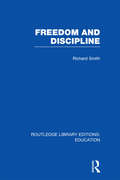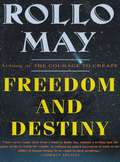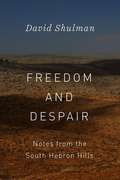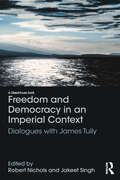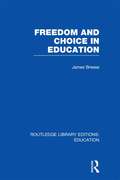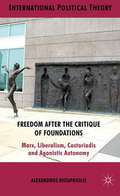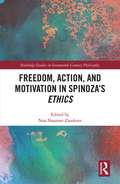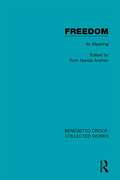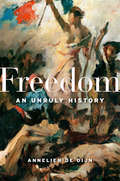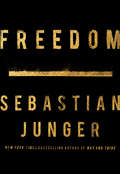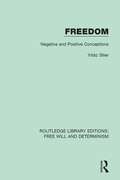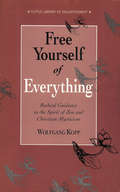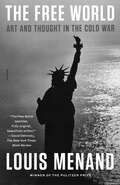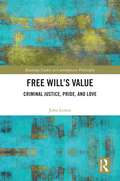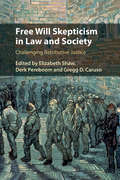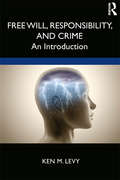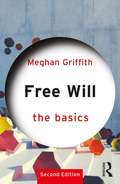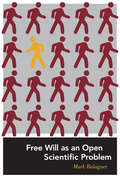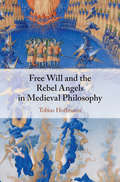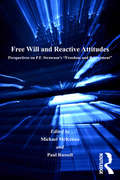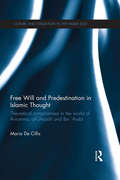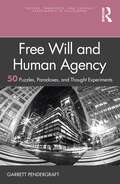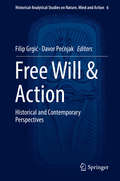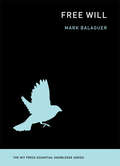- Table View
- List View
Freedom and Discipline (Routledge Library Editions: Education)
by Richard SmithQuestions of discipline and order arise wherever formal education is practised, and are particularly acute for those training to teach or in their first school posts. For many years now writing on these topics has tended to depict teaching as the deployment of ‘skills’ and ‘techniques’ and competent teachers as those who successfully ‘manage’ their classes. This approach is criticised by Richard Smith as manipulative and destructive of the kind of pupil-teacher relationship conducive to any but the most trivial sorts of learning. Thus the philosophical issues which the book explores are shown throughout to have their roots in problems associated with established thinking and practice, and the author’s ideas have considerable practical relevance. He argues for a thorough reappraisal of the nature and basis of the teacher’s authority and demonstrates the importance of a proper understanding of the function of punishment. He suggests that many of the problems of discipline that teachers meet may actually stem from inappropriate ways of treating pupils, and shows that solutions to these problems must be compatible with the degree of initiative and personal responsibility that it is the business of education to foster. Schools have changed in many ways, largely for the better, since the first edition of this book appeared: the young people in them are generally treated with far more respect than was the case a quarter of a century ago. The voices of a more repressive tradition however still make themselves heard from time to time. It is therefore important continually to re-state the principles on which civilised relationships between pupils and teachers need to be based.
Freedom and Destiny
by Rollo May"May is an existential analyst who deservedly enjoys a reputation among both general and critical readers as an accessible and insightful social and psychological theorist. ... Freedom's characteristics, fruits, and problems; destiny's reality; death; and therapy's place in the confrontation between freedom and destiny are examined. ... Poets, social critics, artists, and other thinkers are invoked appropriately to support May's theory of freedom and destiny's interdependence."-Library Journal. "Especially instructive, even stunning, is Dr. May's willingness to respect mystery. ... There is, too, at work throughout the book a disciplined yet relaxed clinical mind, inclined to celebrate ... what Flannery O'Connor called 'mystery and manners,' and to do so in a tactful, meditative manner. "-Robert Coles, America.
Freedom and Despair: Notes from the South Hebron Hills
by David ShulmanLately, it seems as if we wake up to a new atrocity each day. Every morning is now a ritual of scrolling through our Twitter feeds or scanning our newspapers for the latest updates on fresh horrors around the globe. Despite the countless protests we attend, the phone calls we make, or the streets we march, it sometimes feels like no matter how hard we fight, the relentless crush of injustice will never abate. David Shulman knows intimately what it takes to live your beliefs, to return, day after day, to the struggle, despite knowing you are often more likely to lose than win. Interweaving powerful stories and deep meditations, Freedom and Despair offers vivid firsthand reports from the occupied West Bank in Palestine as seen through the eyes of an experienced Israeli peace activist who has seen the Israeli occupation close up as it impacts on the lives of all Palestinian civilians. Alongside a handful of beautifully written and often shocking tales from the field, Shulman meditates deeply on how to understand the evils around him, what it means to persevere as an activist decade after decade, and what it truly means to be free. The violent realities of the occupation are on full display. We get to know and understand the Palestinian shepherds and farmers and Israeli volunteers who face this situation head-on with nonviolent resistance. Shulman does not hold back on acknowledging the daily struggles that often leave him and his fellow activists full of despair. Inspired by these committed individuals who are not prepared to be silent or passive, Shulman suggests a model for ordinary people everywhere. Anyone prepared to take a risk and fight their oppressive political systems, he argues, can make a difference—if they strive to act with compassion and to keep hope alive. This is the moving story of a man who continues to fight for good in the midst of despair. An indispensable book in our era of reactionary politics and refugee crises, political violence and ecological devastation, Freedom and Despair is a gripping memoir of struggle, activism, and hope for peace.
Freedom and Democracy in an Imperial Context: Dialogues with James Tully
by Robert Nichols Jakeet SinghFreedom and Democracy in an Imperial Context: Dialogues with James Tully gathers leading thinkers from across the humanities and social sciences in a celebration of, and critical engagement with, the recent work of Canadian political philosopher James Tully. Over the past thirty years, James Tully has made key contributions to some of the most pressing questions of our time, including: interventions in the history of moral and political thought, contemporary political philosophy, democracy, citizenship, imperialism, recognition and cultural diversity. In 2008, he published Public Philosophy in a New Key, a two-volume work that promises to be one of the most influential and important statements of legal and political thought in recent history. This work, along with numerous other books and articles, is foundational to a distinctive school of political thought, influencing thinkers in fields as diverse as Anthropology, History, Indigenous Studies, Law, Philosophy and Political Science. Critically engaging with James Tully’s thought, the essays in this volume take up what is his central, and ever more pressing, question: how to enact democratic practices of freedom within and against historically sedimented and actually existing relationships of imperialism?
Freedom and Choice in Education (Routledge Library Editions: Education)
by James BreeseMuch of the material included here owes it inspiration to discussions held with groups of student teachers in the early 1970s. The book is written for such students and discusses issues such as the acquisition of knowledge, the value of examinations, dependency and religion in education. The book is intended as a thought provoker – to stimulate further discussion.
Freedom After the Critique of Foundations: Marx, Liberalism, Castoriadis and Agonistic Autonomy (International Political Theory)
by Alexandros KioupkiolisAn exploration of the contemporary re-conception of freedom after the critique of objective truths and ideas of an unchanging human nature, in which modern self-determination was grounded. This book focuses on the radical theorist Cornelius Castoriadis and the new paradigm of 'agonistic autonomy' is contrasted with Marxian and liberal approaches.
Freedom, Action, and Motivation in Spinoza’s "Ethics" (Routledge Studies in Seventeenth-Century Philosophy)
by Noa Naaman-ZaudererThe present volume posits the themes of freedom, action, and motivation as the central principles that drive Spinoza’s Ethics from its first part to its last. It assembles essays by internationally leading scholars who provide different, sometimes opposing interpretations of these fundamental themes as they operate across the five parts of the Ethics and within its manifold domains. The diversity of issues, approaches, and perspectives within this volume, along with the chapters’ common focus, open up new ways of understanding not only some of the key concepts and main objectives in the Ethics but also the threads unifying the entire work. The sequence of essays in the book broadly follows the order of the Ethics, providing up-to-date perspectives of Spinoza’s views on freedom, action, and motivation in their ontological, cognitive, physical, affective, and ethical facets. This enables readers to engage with a variety of new interpretations of these key themes of the Ethics and to reconsider their consequences both for other related issues in the Ethics and for the relevance of the Ethics to contemporary trends in philosophy of action and motivation. The essays will contribute to the growing interest in Spinoza’s Ethics and spark further discussion and debate within and outside the vast body of scholarship on this important work. Freedom, Action, and Motivation in Spinoza’s Ethics will be of interest to scholars and advanced students working on Spinoza and early modern philosophy, as well as on philosophy of action and motivation.
Freedom: Its Meaning (Collected Works)
by Ruth Nanda AnshenOriginally published in 1942 this book brings together contribution from some of the finest thinkers and philosophers of the 20th century such as Boas, Croce, Einstein, Haldane, Mann, and Russell. The volume discusses the problem of Freedom from diverse points of view and offers a synthesis of issues and conclusions relating to freedom as a basis for action with a view to try and fill the gaps existent in the study of the nature of Man.
Freedom: An Unruly History
by Annelien De DijnThe invention of modern freedom—the equating of liberty with restraints on state power—was not the natural outcome of such secular Western trends as the growth of religious tolerance or the creation of market societies. Rather, it was propelled by an antidemocratic backlash following the Atlantic Revolutions. We tend to think of freedom as something that is best protected by carefully circumscribing the boundaries of legitimate state activity. But who came up with this understanding of freedom, and for what purposes? In a masterful and surprising reappraisal of more than two thousand years of thinking about freedom in the West, Annelien de Dijn argues that we owe our view of freedom not to the liberty lovers of the Age of Revolution but to the enemies of democracy. The conception of freedom most prevalent today—that it depends on the limitation of state power—is a deliberate and dramatic rupture with long-established ways of thinking about liberty. For centuries people in the West identified freedom not with being left alone by the state but with the ability to exercise control over the way in which they were governed. They had what might best be described as a democratic conception of liberty. Understanding the long history of freedom underscores how recently it has come to be identified with limited government. It also reveals something crucial about the genealogy of current ways of thinking about freedom. The notion that freedom is best preserved by shrinking the sphere of government was not invented by the revolutionaries of the seventeenth and eighteenth centuries who created our modern democracies—it was invented by their critics and opponents. Rather than following in the path of the American founders, today’s “big government” antagonists more closely resemble the counterrevolutionaries who tried to undo their work.
Freedom
by Sebastian JungerA profound rumination on the concept of freedom from the New York Times–bestselling author of Tribe Throughout history, humans have been driven by the quest for two cherished ideals: community and freedom. The two don’t coexist easily; we value individuality and self-reliance yet are utterly dependent on community for our most basic needs. In this intricately crafted and thought-provoking book, Sebastian Junger examines the tension that lies at the heart of what it means to be human. For much of a year, Junger and three friends—a conflict photographer and two Afghan war vets—walk the railroad lines of the east coast of the United States. It is an experiment in personal autonomy, but also in interdependence. Dodging railroad cops, sleeping under bridges, cooking over fires and drinking from creeks and rivers, the four men forge a unique reliance on one another. In Freedom, Junger weaves his account of this journey with other topics: primatology and boxing strategy, the history of labour strikes and Apache renegades, the role of women in resistance movements, and the brutal reality of life on the Pennsylvania frontier. Written in exquisite, razor-sharp prose, the result is a powerful examination of the primary desire that defines us.
Freedom: Negative and Positive Conceptions (Routledge Library Editions: Free Will and Determinism #5)
by Yıldız SilierIsaiah Berlin made a now classic distinction between negative and positive conceptions of freedom. This book, first published in 2005, introduces a fresh way of looking at these conceptions and presents a new defence of the positive conception of freedom. Revealing how the internal debate between various versions of negative freedom give rise to hybrid conceptions of freedom which in turn are superseded by various versions of the positive conception of freedom, Silier concludes that Marx’s concrete historical account of positive freedom resolves many of the key debates in this area and provides a fruitful framework to evaluate the freedoms and unfreedoms that are specific to capitalism.
Free Yourself of Everything
by Wolfgang Kopp Barbara Wittenberg-HaenauerIntended for those who earnestly seek spiritual guidance, this book conveys, with clear structure and precise language, the deepest wisdom of eastern and western mysticism. Drawing from his vast experience as a practicing meditation master, and using examples from great masters of Zen and Christian mysticism, Wolfgang Kopp presents the fundamental elements necessary for a successful journey to inner freedom.
The Free World: Art and Thought in the Cold War
by Louis Menand"An engrossing and impossibly wide-ranging project . . . In The Free World, every seat is a good one." —Carlos Lozada, The Washington Post"The Free World sparkles. Fully original, beautifully written . . . One hopes Menand has a sequel in mind. The bar is set very high." —David Oshinsky, The New York Times Book ReviewNamed a most anticipated book of April by The New York Times | The Washington Post | Oprah DailyIn his follow-up to the Pulitzer Prize–winning The Metaphysical Club, Louis Menand offers a new intellectual and cultural history of the postwar yearsThe Cold War was not just a contest of power. It was also about ideas, in the broadest sense—economic and political, artistic and personal. In The Free World, the acclaimed Pulitzer Prize–winning scholar and critic Louis Menand tells the story of American culture in the pivotal years from the end of World War II to Vietnam and shows how changing economic, technological, and social forces put their mark on creations of the mind. How did elitism and an anti-totalitarian skepticism of passion and ideology give way to a new sensibility defined by freewheeling experimentation and loving the Beatles? How was the ideal of “freedom” applied to causes that ranged from anti-communism and civil rights to radical acts of self-creation via art and even crime? With the wit and insight familiar to readers of The Metaphysical Club and his New Yorker essays, Menand takes us inside Hannah Arendt’s Manhattan, the Paris of Jean-Paul Sartre and Simone de Beauvoir, Merce Cunningham and John Cage’s residencies at North Carolina’s Black Mountain College, and the Memphis studio where Sam Phillips and Elvis Presley created a new music for the American teenager. He examines the post war vogue for French existentialism, structuralism and post-structuralism, the rise of abstract expressionism and pop art, Allen Ginsberg’s friendship with Lionel Trilling, James Baldwin’s transformation into a Civil Right spokesman, Susan Sontag’s challenges to the New York Intellectuals, the defeat of obscenity laws, and the rise of the New Hollywood. Stressing the rich flow of ideas across the Atlantic, he also shows how Europeans played a vital role in promoting and influencing American art and entertainment. By the end of the Vietnam era, the American government had lost the moral prestige it enjoyed at the end of the Second World War, but America’s once-despised culture had become respected and adored. With unprecedented verve and range, this book explains how that happened.
Free Will’s Value: Criminal Justice, Pride, and Love (Routledge Studies in Contemporary Philosophy)
by John LemosThis book defends an event-causal theory of libertarian free will and argues that the belief in such free will plays an important, if not essential, role in supporting certain important values. In the first part of the book, the author argues that possession of libertarian free will is necessary for deserved praise and blame and reward and punishment. He contends that his version of libertarian free will – the indeterministic weightings view – is coherent and can fit with a scientific, naturalistic understanding of human nature. However, the author also notes that we don’t have sufficient evidentiary grounds to believe that human beings have this kind of free will. Despite this, he argues there are sufficiently strong value-based/axiological reasons to believe we have such free will and to live and act as if we have it. In the second part of the book, the author makes the case that the belief in such libertarian, desert-grounding free will is very important to defending human dignity in the context of criminal justice, making sense of justified pride and its value, and adding value to our relationships. Free Will’s Value will be of interest to scholars and advanced students working in metaphysics, philosophy of mind, action theory, ethics, and the philosophy of law.
Free Will Skepticism in Law and Society: Challenging Retributive Justice
by Elizabeth Shaw Derk Pereboom Gregg D. Caruso'Free will skepticism' refers to a family of views that all take seriously the possibility that human beings lack the control in action - i.e. the free will - required for an agent to be truly deserving of blame and praise, punishment and reward. Critics fear that adopting this view would have harmful consequences for our interpersonal relationships, society, morality, meaning, and laws. Optimistic free will skeptics, on the other hand, respond by arguing that life without free will and so-called basic desert moral responsibility would not be harmful in these ways, and might even be beneficial. This collection addresses the practical implications of free will skepticism for law and society. It contains eleven original essays that provide alternatives to retributive punishment, explore what (if any) changes are needed for the criminal justice system, and ask whether we should be optimistic or pessimistic about the real-world implications of free will skepticism.
Free Will, Responsibility, and Crime: An Introduction
by Ken M. LevyIn his book, philosopher and law professor Ken Levy explains why he agrees with most people, but not with most other philosophers, about free will and responsibility. Most people believe that we have both – that is, that our choices, decisions, and actions are neither determined nor undetermined but rather fully self-determined. By contrast, most philosophers understand just how difficult it is to defend this "metaphysical libertarian" position. So they tend to opt for two other theories: "responsibility skepticism" (which denies the very possibility of free will and responsibility) and "compatibilism" (which reduces free will and responsibility to properties that are compatible with determinism). In opposition to both of these theories, Levy explains how free will and responsibility are indeed metaphysically possible. But he also cautions against the dogma that metaphysical libertarianism is actually true, a widespread belief that continues to cause serious social, political, and legal harms. Levy’s book presents a crisp, tight, historically informed discussion, with fresh clarity, insight, and originality. It will become one of the definitive resources for students, academics, and general readers in this critical intersection among metaphysics, ethics, and criminal law. Key features: Presents a unique, qualified defense of "metaphysical libertarianism," the idea that our choices, decisions, and actions can be fully self-determined. Written clearly, accessibly, and with minimal jargon – rare for a book on the very difficult issues of free will and responsibility. Seamlessly connects philosophical, legal, psychological, and political issues. Will be provocative and insightful for professional philosophers, students, and non-philosophers.
Free Will: The Basics (The Basics)
by Meghan GriffithThe issue of whether humans are free to make their own decisions has long been debated, and it continues to be controversial today. In Free Will: The Basics Meghan Griffith provides a clear and accessible introduction to this important but challenging philosophical problem. She addresses the questions central to the topic including: Does free will exist, or is it illusory? Can we be free even if everything is determined by a chain of causes? If our actions are not determined, does this mean they are just random or a matter of luck? In order to have the kind of freedom required for moral responsibility, must we have alternatives? What can recent developments in science tell us about the existence of free will? These questions are discussed without prejudicing one view over others, and all technical terminology is clearly explained. This second edition has been revised and updated throughout, with the addition of new sections on dispositionalism, free will as self-organization, and situationism in psychology. Up-to-date suggestions for further reading and a glossary are also included, making Free Will: The Basics an ideal introduction for anyone coming to the subject for the first time.
Free Will as an Open Scientific Problem
by Mark BalaguerAn argument that the problem of free will boils down to an open scientific question about the causal histories of certain kinds of neural events.In this largely antimetaphysical treatment of free will and determinism, Mark Balaguer argues that the philosophical problem of free will boils down to an open scientific question about the causal histories of certain kinds of neural events. In the course of his argument, Balaguer provides a naturalistic defense of the libertarian view of free will.The metaphysical component of the problem of free will, Balaguer argues, essentially boils down to the question of whether humans possess libertarian free will. Furthermore, he argues that, contrary to the traditional wisdom, the libertarian question reduces to a question about indeterminacy—in particular, to a straightforward empirical question about whether certain neural events in our heads are causally undetermined in a certain specific way; in other words, Balaguer argues that the right kind of indeterminacy would bring with it all of the other requirements for libertarian free will. Finally, he argues that because there is no good evidence as to whether or not the relevant neural events are undetermined in the way that's required, the question of whether human beings possess libertarian free will is a wide-open empirical question.
Free Will and the Rebel Angels in Medieval Philosophy
by Tobias HoffmannIn this book Tobias Hoffmann studies the medieval free will debate during its liveliest period, from the 1220s to the 1320s, and clarifies its background in Aristotle, Augustine, and earlier medieval thinkers. Among the wide range of authors he examines are not only well-known thinkers such as Thomas Aquinas, Duns Scotus, and William of Ockham, but also a number of authors who were just as important in their time and deserve to be rediscovered today. To shed further light on their theories of free will, Hoffmann also explores their competing philosophical explanations of the fall of the angels, that is, the hypothesis of an evil choice made by rational beings under optimal psychological conditions. As he shows, this test case imposed limits on tracing free choices to cognition. His book provides a comprehensive account of a debate that was central to medieval philosophy and continues to occupy philosophers today.
Free Will and the Brain
by Walter GlannonNeuroscientific evidence has educated us in the ways in which the brain mediates our thought and behavior and, therefore, forced us to critically examine how we conceive of free will. This volume, featuring contributions from an international and interdisciplinary group of distinguished researchers and scholars, explores how our increasing knowledge of the brain can elucidate the concept of the will and whether or to what extent it is free. It also examines how brain science can inform our normative judgments of moral and criminal responsibility for our actions. Some chapters point out the different respects in which mental disorders can compromise the will and others show how different forms of neuromodulation can reveal the neural underpinning of the mental capacities associated with the will and can restore or enhance them when they are impaired.
Free Will and Reactive Attitudes: Perspectives on P.F. Strawson's 'Freedom and Resentment'
by Paul Russell Michael MckennaThe philosophical debate about free will and responsibility has been of great importance throughout the history of philosophy. In modern times this debate has received an enormous resurgence of interest and the contribution in 1962 by P.F. Strawson with the publication of his essay "Freedom and Resentment" has generated a wide range of discussion and criticism in the philosophical community and beyond. The debate is of central importance to recent developments in the free will literature and has shaped the way contemporary philosophers now approach the problem. This volume brings together a focused selection of the major contributions and reactions to the free will and responsibility debate inspired by Strawson's contribution. McKenna and Russell also provide a comprehensive overview of the debate. This book will be of great value to scholars of Strawson and those interested in the free will debate more generally.
Free Will and Predestination in Islamic Thought: Theoretical Compromises in the Works of Avicenna, al-Ghazali and Ibn 'Arabi (Culture and Civilization in the Middle East)
by Maria De CillisThe subject of "human free-will" versus "divine predestination" is one of the most contentious topics in classical Islamic thought. By focusing on a theme of central importance to any philosophy of religion, and to Islam in particular, this book offers a critical study of the intellectual contributions offered to this discourse by three key medieval Islamic thinkers: Avicenna, al-Ghāzālī and Ibn ʿArabī. Through investigation of primary sources, Free Will and Predestination in Islamic Thought establishes the historical, political and intellectual circumstances which prompted Avicenna, al-Ghāzālī and Ibn ʿArabī’s attempts at harmonization. By analysing the theoretical and linguistic ‘techniques’ which were employed to convey these endeavours, this book demonstrates that the three individuals were committed to compromise between philosophical, theological and mystical outlooks. Arguing that the three scholars’ treatments of the so-called qaḍā wa’l-qadar (decree and destiny) and ikhtiyār (free-will) issues were innovative, influential and fundamentally more complex than hitherto recognized, this book contributes to a fuller understanding of Islamic intellectual history and culture and will be useful to researchers interested in Islamic Studies, Religion and Islamic Mysticism.
Free Will and Human Agency: 50 Puzzles, Paradoxes, and Thought Experiments (Puzzles, Paradoxes, and Thought Experiments in Philosophy)
by Garrett PendergraftIn this new kind of entrée to contemporary discussions of free will and human agency, Garrett Pendergraft collects and illuminates 50 of the most relevant puzzles, paradoxes, and thought experiments. Assuming no familiarity with the philosophical literature on free will, each chapter describes a case, explains the questions that it raises, briefly summarizes some of the key responses to the case, and provides a list of suggested readings. Every chapter is accessible, succinct, and self-contained. The puzzles are divided into five broad categories: the threat from fatalism, the threat from determinism, practical reason, social dimensions, and moral luck. Entries cover topics such as the grandfather paradox, theological fatalism, the consequence argument, manipulation arguments, luck arguments, weakness of will, action explanation, addiction, blame and punishment, situationism in moral psychology, and Huckleberry Finn. Free Will and Human Agency is an effective and engaging teaching tool as well as a handy resource for anyone interested in exploring the questions that have made human agency a topic of perennial philosophical interest. Key Features: Though concise overall, offers broad coverage of the key areas of free will and human agency. Describes each imaginative case directly and in a memorable way, making the cases accessible and easy to remember. Provides a list of suggested readings for each case.
Free Will & Action: Historical and Contemporary Perspectives (Historical-Analytical Studies on Nature, Mind and Action #6)
by Filip Grgić Davor PećnjakThis book consists of eleven new essays that provide new insights into classical and contemporary issues surrounding free will and human agency. They investigate topics such as the nature of practical knowledge and its role in intentional action; mental content and explanations of action; recent arguments for libertarianism; the situationist challenge to free will; freedom and a theory of narrative configuration; the moral responsibility of the psychopath; and free will and the indeterminism of quantum mechanics. Also tackling some historical precursors of contemporary debates, taken together these essays demonstrate the need for an approach that recognizes the multifaceted nature of free will. This book provides essential reading for anyone interested in the current scholarship on free will.
Free Will (The MIT Press Essential Knowledge Series)
by Mark BalaguerA philosopher considers whether the scientific and philosophical arguments against free will are reason enough to give up our belief in it. In our daily life, it really seems as though we have free will, that what we do from moment to moment is determined by conscious decisions that we freely make. You get up from the couch, you go for a walk, you eat chocolate ice cream. It seems that we're in control of actions like these; if we are, then we have free will. But in recent years, some have argued that free will is an illusion. The neuroscientist (and best-selling author) Sam Harris and the late Harvard psychologist Daniel Wegner, for example, claim that certain scientific findings disprove free will. In this engaging and accessible volume in the Essential Knowledge series, the philosopher Mark Balaguer examines the various arguments and experiments that have been cited to support the claim that human beings don't have free will. He finds them to be overstated and misguided. Balaguer discusses determinism, the view that every physical event is predetermined, or completely caused by prior events. He describes several philosophical and scientific arguments against free will, including one based on Benjamin Libet's famous neuroscientific experiments, which allegedly show that our conscious decisions are caused by neural events that occur before we choose. He considers various religious and philosophical views, including the philosophical pro-free-will view known as compatibilism. Balaguer concludes that the anti-free-will arguments put forward by philosophers, psychologists, and neuroscientists simply don't work. They don't provide any good reason to doubt the existence of free will. But, he cautions, this doesn't necessarily mean that we have free will. The question of whether we have free will remains an open one; we simply don't know enough about the brain to answer it definitively.
